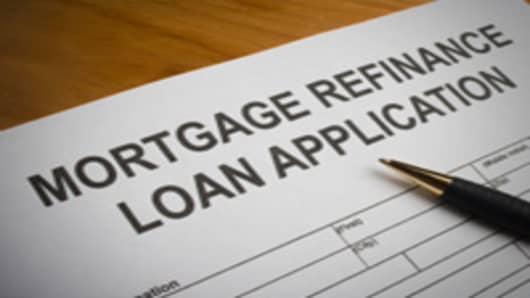After announcing during his State of the Union address a new government refinance programfor, "responsible" but "underwater" borrowers with privately held mortgages, President Obama is expected to detail the plan today.
It will go through the government mortgage insurer, the Federal Housing Administration (FHA) and could cost between $5 billion and $10 billion dollars, according to senior administration officials.
The cost of the program, officials say, would be covered by a tax on major lenders, which is likely to make it a no-go in Congress.
It would cover closing fees for borrowers and additional risk to the FHA, which doesn't insure new loans where the borrower owes more than the home is worth.
Critics will also argue that the FHA, which now has an inordinately, historically large share of the mortgage market, is in no position to take on any more risk. The FHA could be considered "underwater" itself, guaranteeing about $1 trillion in mortgages but sitting on just a $1.2 billion dollar cushion to cover losses.
To that end, officials say they could create a separate fund for these loans, not the regular mutual mortgage insurance fund (MMI). This would be a special risk fund, designed to handle high losses.
"In this program we're talking about extraordinary circumstances," says Brian Chappelle of Potomac Partners. "People have played by the rules, they made payments in addition to the fact that their house is underwater, they're paying excessively high rates. It's a unique homeowner, not somebody looking for a handout."
To be eligible, borrowers would have to be current on their mortgages, not having missed a payment in at least six months. They need a credit score (FICO) above 580, must be employed, and must have a conforming loan (between $271,050 and $729,750 depending on their location). No appraisal would be necessary, according to officials.
Estimates are that the plan could help 3.5 million borrowers in addition to the 11 million expected to qualify for the existing refinance program for those with Fannie Mae and Freddie Mac loans (HARP). The one sticking point could be the mortgage insurance premiums charged by the FHA. If rolled into the loan, they would put a borrower further underwater.
"To use taxpayer dollars to bail out the few who are current and don’t need payment assistance but are underwater is ludicrous and worsens their equity position," says JT Smith of Aristar Funding.
The plan would also require lenders to write down the value of the loan if it exceeded 140 percent of the value of the home. Administration officials say the trade-off for lenders is they get rid of a risky loan.
On the flip side, the government would then be backing that same risky loan, but officials argue they would offset some of that risk because in order to get closing fees paid, the borrower has to agree to use the lower interest rate savings on the refinance to pay off principal balance.
The plan faces many headwinds, first and foremost being Congressional approval; borrowers and lenders would also have to agree to all the requirements, as this is not an automatic plan but a voluntary, borrower-initiated deal. It would also rile Wall Street, as hundreds of thousands of loans could "pre-pay," which means the bondholders lose.
"Some say it undermines the value of existing [mortgage] securities, so they would build a premium in," notes Chappelle. That could make future loans for other Americans more expensive.
Questions? Comments? RealtyCheck@cnbc.comAnd follow me on Twitter @Diana_Olick



